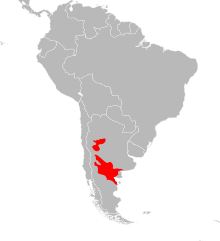| This article needs additional citations for verification. Please help improve this article by adding citations to reliable sources. Unsourced material may be challenged and removed. Find sources: "Liolaemus darwinii" – news · newspapers · books · scholar · JSTOR (October 2012) (Learn how and when to remove this message) |
| Liolaemus darwinii | |
|---|---|
| Conservation status | |
 Least Concern (IUCN 3.1) | |
| Scientific classification | |
| Domain: | Eukaryota |
| Kingdom: | Animalia |
| Phylum: | Chordata |
| Class: | Reptilia |
| Order: | Squamata |
| Suborder: | Iguania |
| Family: | Liolaemidae |
| Genus: | Liolaemus |
| Species: | L. darwinii |
| Binomial name | |
| Liolaemus darwinii (Bell, 1843) | |

| |
| Range map | |
| Synonyms | |
Liolaemus darwinii, also known commonly as Darwin's tree iguana, is a species of lizard in the family Liolaemidae. The species is endemic to Argentina.
Etymology
The specific name, darwinii, is in honor of English naturalist Charles Darwin, the author of On the Origin of Species.
Habitat
The preferred natural habitat of L. darwinii is shrubland, at altitudes from sea level to 3,000 m (9,800 ft).
Description
The males of L. darwinii are brown with two yellow dorsal stripes that run along the spine, one on each side of the back. The females are solely brown.
Diet
L. darwinii eats various insects 5 cm (2.0 in) or less in length, including beetles and locusts.
Behavior
L. darwinii is diurnal. During nights and cold days, it burrows underground. It is a solitary and territorial. Males and females compete for territory.
Reproduction
L. darwinii is oviparous. The mating season is in mid-February, and the nesting time is eight months later. The hatchlings are 5 cm (2.0 in) long, and clutch size is typically between 10 and 12.
References
- ^ Pelegrin, N.; Avila, L. & Kacoliris, F. (2016). "Liolaemus darwinii ". The IUCN Red List of Threatened Species. 2016. IUCN: e.T56052691A56052804. doi:10.2305/IUCN.UK.2016-1.RLTS.T56052691A56052804.en. Retrieved 9 December 2017.
- ^ Species Liolaemus darwinii at The Reptile Database www.reptile-database.org.
- Beolens, Bo; Watkins, Michael; Grayson, Michael (2011). The Eponym Dictionary of Reptiles. Baltimore: Johns Hopkins University Press. xiii + 296 pp. ISBN 978-1-4214-0135-5. (Liolaemus darwinii, p. 65).
Further reading
- Bell T (1843). The Zoology of H.M.S. Beagle, Under the Command of Captain Fitzroy, R.N., During the Years 1832 to 1836. London: Smith, Elder and Company. (Stewart and Murray, printers). vi + 51 pp. + Plates 1–20. (Proctotretus darwinii, new species, pp. 14–15 + Plate 7, Figures 1, 1a, 1b, 2, 2a).
- Boulenger GA (1885). Catalogue of the Lizards in the British Museum (Natural History). Second Edition. Volume II. Iguanidæ .... London: Trustees of the British Museum (Natural History). (Taylor and Francis, printers). xiii + 497 pp. + Plates I–XXIV. ("Liolæmus darwinii ", p. 155).
- Donoso-Barros, Roberto (1966). Reptiles de Chile. Santiago: Ediciones Universidad de Chile. 458 pp.
| Taxon identifiers | |
|---|---|
| Liolaemus darwinii | |
This lizard article is a stub. You can help Misplaced Pages by expanding it. |